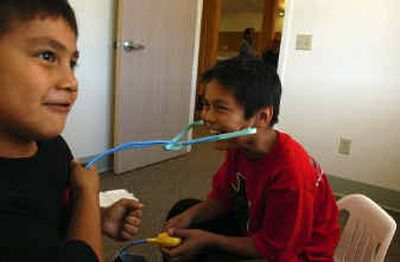Healthy addition

KELLER, Wash. – Residents of this isolated little community in a corner of the Colville Indian Reservation turned out Friday to celebrate the opening of their first permanent health clinic.
Many of the 140 or so people who gathered at the new Sanpoil Valley Health Clinic had a hand in creating it – including Billie Jo Bray, a mother of seven who no longer has to remove her children from school for a whole day when they need medical or dental care.
A dentist is to be hired soon, but certified physician’s assistant Bob Schaller already is treating 10 to 15 patients three days a week. His practice is growing, and he shortly expects to be operating five days a week.
Schaller has several examination rooms, a surgery area and a laboratory where he can perform a number of diagnostic tests.
The dental portion of the clinic has two dental chairs and a prosthetics lab where false teeth can be manufactured. The building also has a pharmacy, a records archive and several rooms for a variety of community health programs.
Since the spacious new clinic opened July 26, Bray has been spared a 50-mile trip to Nespelem for the sports physical one of her older sons needed. Her 2-year-old son received quick treatment for a fever and rash Bray feared might be a dangerous allergic reaction.
“It’s just reassuring,” Bray said. “I’ve had no problems getting my kids in, and that’s the most important thing.”
Overcrowding at the Indian Health Service clinic in Nespelem often compounds the problem of driving the windy, often icy mountain roads to get there, Bray said.
Inchelium is another option. “It’s about an hour drive,” said tribal elder Marguerite McCuen.
Four-hundred to 500 people live in the Keller area, which is completely ringed by mountains and the Columbia River. No matter where they went for treatment – Nespelem, Republic, Inchelium, Grand Coulee or Spokane – patients had to cross those mountains or take a ferry that could add up to 45 minutes to the trip with unlucky timing.
They’ve had only sporadic local health service in Keller. Tribal Councilman John Stensgar recalled an Indian Health Service clinic two decades ago in a trailer “that probably would have been condemned.” Lately, there’s been no local service.
Where people went for health care often was determined by whether they were tribal members. That’s no longer an issue.
The 7,923-square-foot, $1.7 million clinic was built with a combination of tribal, state and federal money to serve tribal and non-tribal residents alike. Non-residents will be charged on a sliding scale, according to their ability to pay.
Open-door health care, although successfully implemented by the Coeur d’Alene Tribe of Idaho, is still unusual in Indian Country.
But, as demonstrated by the potluck meal that followed Thursday’s ceremony, Keller is a mixed community of people who seem comfortable with their differences.
“This community is members and non-members, but we are one community,” said tribal elder Lester Herman, chairman of the board that oversees the Keller clinic and a newly reconstructed Inchelium Community Health Center.
The $3.9 million Inchelium clinic has 20,627 square feet and the same open-door policy as Keller’s Sanpoil Valley Health Clinic. Chief Executive Officer Flip Arnold oversees both.
Both projects relied heavily on the grant-writing services of Spokane consultant Gary Leva, who previously helped the Coeur d’Alene Tribe build its Benewah Medical Center in Plummer, Idaho.
Herman was a natural choice to lead the effort when Keller residents formed a committee in October 1997, according to Bray, a committee member. She said Herman is a hard-headed cattle rancher who gets things done.
“You tell him no, but he hears Y-E-S,” Ferry County Commissioner Mike Blankenship said Thursday.
In fact, the whole community is that way, tribal Chairman Joe Pakootas said. Nobody would listen when tribal leaders tried to tell Keller residents what couldn’t be done, he said.
The result, Pakootas said, is “a great day for Keller and for the Colville Tribes.”
Plans to acquire more equipment and to provide more services at the clinic already are in the works, so Pakootas told Herman to hang on to his gold-painted chairman’s hardhat.
“One of our board members said, ‘You put this here on and don’t you take it off till you’re done,’ ” Herman said, fingering the hat.
Despite “hundreds of meetings,” it was work the 71-year-old, lifelong Keller resident was pleased to do. He wonders whether quick local treatment might have helped when his brother, Albert, was killed by a car wreck in the early 1980s. He knows a local clinic would have helped him earlier this year when he had to go to Nespelem for diagnosis of a problem that caused his lungs to fill with fluid.
“It’s not a pleasant trip,” he said.
Especially not when you’re sick, pregnant or coping with several children, Herman’s wife, Barbara, added. A non-tribal member, she also was active in the campaign to build the clinic.
“The community is extremely behind this place,” Schaller said. “I’m just proud to be part of it.”